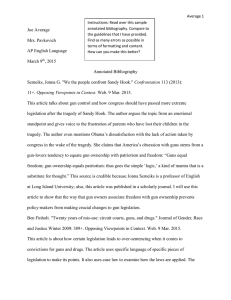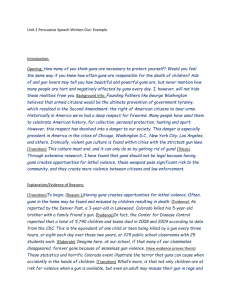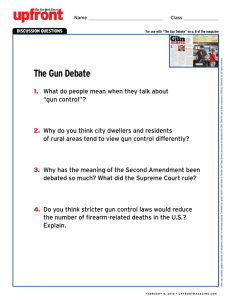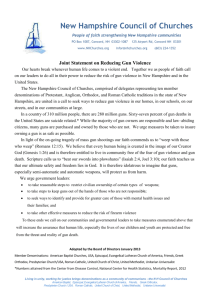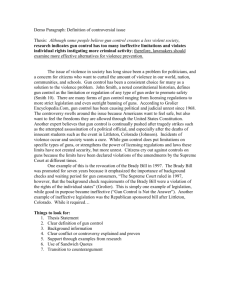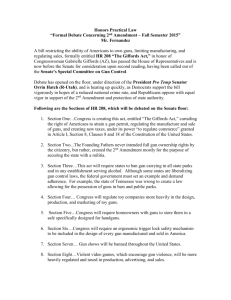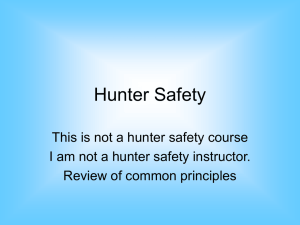DV-Dec-2014-v3-NY-Law - New Yorkers Against Gun Violence
advertisement
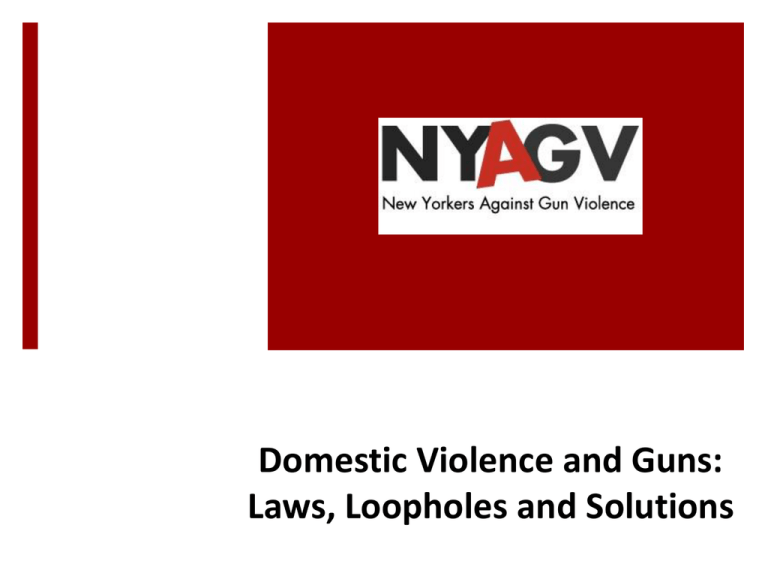
Domestic Violence and Guns: Laws, Loopholes and Solutions Gun Violence in America: A Public Health Crisis 33,563 gun deaths (2012) 92 deaths a day 84,258 injured (2013) Over $170 billion in costs Women and Gun Violence in America A gun can mean the difference between an argument and a funeral. The presence of a gun increases the risk of homicide for women 5x in a domestic violence situation U.S. women are 11x more likely to be murdered with a gun than women in high income nations Women and Gun Violence in America 53% of women murdered with guns were killed by an intimate partner or family member (2011) 6,410 women between 2001-2012 were murdered by an intimate partner with a gun Guns are used in fatal intimate partner violence more than any other weapon Intimate Partner-related Homicides Committed With a Gun (2003-2012) Six Lowest States Rank State % 1 MA 22.5 2 RI 23.3 3 IL 26.9 4 HI 29.4 5 NY 30.5 6 NJ 30.5 Intimate Partner-related Homicides Committed With a Gun (2003-2012) Six Highest States Rank State % 50 KY 70.8 49 ID 69.0 48 MT 65.9 47 AL 65.6 46 WVA 61.8 45 AZ 61.1 Federal Laws: Guns and Domestic Violence 1994 Violence Against Women Act (VAWA) Prohibits those subject to DV restraining orders from accessing guns From 1998- July 2014 over 460,000 were barred from buying a gun Federal Laws: Guns and Domestic Violence 1996 Lautenberg Amendment Prohibits those convicted of DV misdemeanors from owning or possessing guns Over 109,000 were barred from buying a gun because of this law from 1998-2014 DV misdemeanors: 3rd most frequent reason for denial of gun applications What’s a misdemeanor crime of domestic violence? An offense that is a federal, state or tribal law misdemeanor and includes the use or attempted use of physical force or threatened use of a deadly weapon To qualify as an offender of misdemeanor crimes of DV, one must... Be a current or former spouse, parent, or guardian of the victim Share a child in common with the victim Be a current or former cohabitant with the victim as spouse, parent or guardian Be similarly situated to a spouse, parent or guardian of the victim Loopholes in Federal Law Laws do not prohibit gun possession by: Those convicted of misdemeanor stalking crimes Abusers in non co-habiting dating relationships Why be concerned about stalkers? 76% of women murdered by a current or former intimate partner experienced stalking in the year before the murder 1 in 6 women has experienced stalking Why be concerned about dating partner violence? Nearly half (48.6%) of all intimate partner homicides were committed by a dating partner Current/former dating partners commit nonfatal violence against women at a greater rate than do current/former spouses (39% vs. 25%) Closing loopholes: What’s needed? Limit stalkers’ and abusers’ access to guns Expand federal prohibitions to include convicted stalkers and abusive dating partners Restrict those subject to temporary restraining orders from owning or possessing guns Expand the background check system to prohibit abusers from getting guns Improve DV record submissions to NICS There’s broad public support for closing these loopholes. 81% of Americans support banning gun ownership for 10 years if a person has violated a DV restraining order Over 73% of gun owners and 72% of non-gun owners support banning gun ownership for 10 years after a DV conviction Proposed federal legislation: The Protecting Domestic Violence and Stalking Victims Act Would bar convicted stalkers from buying or owning guns Would prevent abusive dating partners with a DV misdemeanor or order of protection from buying or owning guns Introduced in 2013 as S. 1290 and H.R. 4906 Senator Amy Klobucher, Senate bill sponsor Proposed federal legislation: The Lori Jackson Domestic Violence Survivor Protection Act Would bar from buying or owning guns: Convicted stalkers Abusive dating partners with DV misdemeanor or orders of protection Those subject to a temporary restraining order Introduced in 2014 as S. 2483 Senator Richard Blumenthal, Senate bill sponsor Proposed federal legislation: The Thompson-King Background Check Bill Would expand background checks to online and gun show sales Introduced in 2013 as H.R. 1565, with 188 co-sponsors House equivalent of the Manchin-Toomey amendment rejected by Senate in April 2013 by 54-46 vote States are leading the way in protecting domestic violence victims. 12 states prohibit people convicted of violent misdemeanors against dating partners from having guns 25 states—including New York-- prohibit gun possession by at least some people subject to protective orders for dating partners What does New York Law say about abusers and guns? Anyone who fails a background check can’t buy a gun. Individuals subject to a domestic violence protective order will have their license revoked and must surrender all guns in their possession. Individuals convicted of a felony or serious offense will have their license revoked and must surrender guns in their possession. Loopholes in New York Law New York law does not provide for the surrender of guns, rifles or shotguns upon conviction of a misdemeanor crime of domestic violence. This gap needs to be filled since under federal and state law this person would be prohibited from buying a gun. Loopholes in New York Law New York law does not allow law enforcement to seize black powder rifles and shotguns, muzzle-loading guns or antique firearms because they are not included in the definition of a firearm, rifle or shotgun. This gap needs to be filled since these weapons are very common in rural areas and are very powerful. Loopholes in New York Law New York law does not require law enforcement to remove guns from the scene of a domestic violence incident even if an arrest is made. This gap needs to be filled since a gun in the house increases the risk homicide for women 5x in a domestic violence situation. New York must close these loopholes by Requiring that any person convicted of a misdemeanor crime of DV to surrender all firearms in their possession. Making it a crime to possess a black powder rifle or shotgun, a muzzle-loading gun or antique firearm and to surrender any such guns upon the conviction of a felony, serious offense or misdemeanor crime of DV. Allowing law enforcement to temporarily seize all guns when responding to a DV incident. Strong gun laws matter. States with higher gun ownership and weak gun laws have the highest rates of gun death. Rank State Gun Ownership Gun Death Rate per 100k 1 WY 62.8% 20.29 2 LA 45.6% 18.36 3 AK 60.6% 18.07 4 MS 54.3% 17.91 5 AL 57.2% 17.25 2012. Center for Disease Control, WISQARS Strong gun laws save lives. States with strong gun laws and low gun ownership have far lower gun death rates. Rank State Gun Ownership Gun Death Rate per 100k 1 MA 12.8% 3.51 2 HI 9.7% 3.67 3 RI 13.3% 4.00 4 NY 18.1% 4.99 5 NJ 11.3% 5.46 2012, Center for Disease Control, WISQARS Take action! Federal: Contact your House representatives and Senators to sponsor the federal domestic violence bills. (Bill numbers to come with new Congressional session.) New York State: Bill numbers to be assigned before legislative session in January, 2015. A sponsoring DV organization is needed for the NYS bills. Contact your NYS Senators and Assembly representatives to sponsor the NYS bills. Sign up at www.nyagv.org for alerts. Questions? nyagv.org
